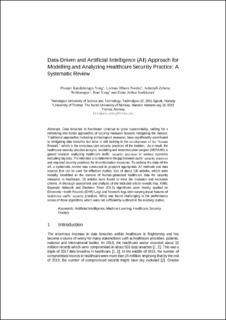| dc.contributor.author | Yeng, Prosper | |
| dc.contributor.author | Nweke, Livinus Obiora | |
| dc.contributor.author | Woldaregay, Ashenafi Zebene | |
| dc.contributor.author | Yang, Bian | |
| dc.contributor.author | Snekkenes, Einar Arthur | |
| dc.date.accessioned | 2020-09-21T07:10:16Z | |
| dc.date.available | 2020-09-21T07:10:16Z | |
| dc.date.created | 2020-03-02T09:19:30Z | |
| dc.date.issued | 2020 | |
| dc.identifier.issn | 2194-5357 | |
| dc.identifier.uri | https://hdl.handle.net/11250/2678629 | |
| dc.description.abstract | Data breaches in healthcare continue to grow exponentially, calling for a rethinking into better approaches of security measures towards mitigating the menace. Traditional approaches including technological measures, have significantly contributed to mitigating data breaches but what is still lacking is the development of the “human firewall,” which is the conscious care security practices of the insiders. As a result, the healthcare security practice analysis, modeling and incentivization project (HSPAMI) is geared towards analyzing healthcare staffs’ security practices in various scenarios including big data. The intention is to determine the gap between staffs’ security practices and required security practices for incentivization measures. To address the state-of-the art, a systematic review was conducted to pinpoint appropriate AI methods and data sources that can be used for effective studies. Out of about 130 articles, which were initially identified in the context of human-generated healthcare data for security measures in healthcare, 15 articles were found to meet the inclusion and exclusion criteria. A thorough assessment and analysis of the included article reveals that, KNN, Bayesian Network and Decision Trees (C4.5) algorithms were mostly applied on Electronic Health Records (EHR) Logs and Network logs with varying input features of healthcare staffs’ security practices. What was found challenging is the performance scores of these algorithms which were not sufficiently outlined in the existing studies. | en_US |
| dc.language.iso | eng | en_US |
| dc.publisher | Springer Verlag | en_US |
| dc.title | Data-Driven and Artificial Intelligence (AI) Approach for Modelling and Analyzing Healthcare Security Practice: A Systematic Review | en_US |
| dc.type | Peer reviewed | en_US |
| dc.type | Journal article | en_US |
| dc.description.version | acceptedVersion | en_US |
| dc.source.journal | Advances in Intelligent Systems and Computing | en_US |
| dc.identifier.doi | 10.1007/978-3-030-55180-3_1 | |
| dc.identifier.cristin | 1798818 | |
| dc.description.localcode | This is a post-peer-review, pre-copyedit version of an article. Locked until 25.8.2021 due to copyright restrictions. The final authenticated version is available online at: http://dx.doi.org/10.1007/978-3-030-55180-3_1 | en_US |
| cristin.unitcode | 194,63,30,0 | |
| cristin.unitname | Institutt for informasjonssikkerhet og kommunikasjonsteknologi | |
| cristin.ispublished | false | |
| cristin.fulltext | postprint | |
| cristin.qualitycode | 1 | |
